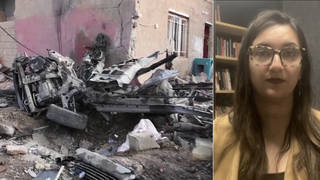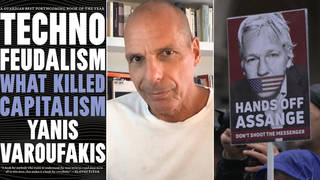
Related
Topics
U.S. officials said that up to 54 Iraqi guerillas were killed in a battle and 16 wounded Sunday in the northern Iraqi town of Samarra, but Iraqis say the local hospital received the bodies of only eight dead civilians as well as 60 others wounded. We go to Iraq to speak with Newsday’s Mohamad Bazzi. [Includes transcript]
Widely differing accounts are emerging over a battle Sunday between U.S. troops and Iraqi resistance fighters in the northern Iraqi town of Samarra.
The U.S. Army said that either 46 or 54 guerillas were killed in the clashes and another 16 wounded in what it described as the bloodiest fire-fight since the official end of the war. Brigadier General Mark Kimmitt later admitted that the U.S. figures are only estimates and that U.S. forces had not recovered a single body from the scene.
Iraqi accounts differ sharply. The director of the local hospitals says they received the bodies of only eight civilians, including those of a woman and child as well as 60 others wounded. U.S. military officials denied their forces had overreacted and fired indiscriminately, as charged by senior police, hospital and municipal officials in the Samarra.
- Mohamad Bazzi, Newsday correspondent reporting from Baghdad.
Transcript
AMY GOODMAN:Mohammad Bazzi is with us now. He is a Newsday correspondent reporting from Iraq. Welcome to Democracy Now!
MOHAMMAD BAZZI: Thank you.
AMY GOODMAN: It’s good to have you with us. Can you describe how the story has evolved?
MOHAMMAD BAZZI: Well, on Sunday, this battle took place in Samara. I think no one disagrees that it was a big battle. There was a lot of fighting. It went on over two hours. This is when the American convoys, who were bringing in money to two banks in Samara to replace the old currency, and immediately from that — from Sunday evening, the American military’s claim was that initially 46 Iraqis had been killed. The next day on Monday, that number went up to 54, and from that day, the residents of Samara say that the number was not more than 10. As you said, the hospital — local hospital received eight bodies, only. Most of them civilians. So, the wide discrepancy is really over the bodies. There were no bodies found. A lot of the residents say that a lot of people were involved in the fighting, dozens of Iraqis, but the bodies simply disappeared.
AMY GOODMAN: Reports are that an Iranian citizen was killed. Is this true, a pilgrim?
MOHAMMAD BAZZI: Yes. Samara is home to a major Shia Muslim shrine called the Ima’am al Rahdi mosque. It draws thousands of Iranian pilgrims every day. They can be found all over central Samara near the shrine. The hospital reported getting a body of an elderly woman who was a pilgrim, apparently caught in the crossfire.
AMY GOODMAN: What about the reports we first heard that the US soldiers were fighting with Fedayeen, and they had killed more than 40 of them, uniformed Fedayeen of Saddam Hussein?
MOHAMMAD BAZZI: Well, that’s — I mean, that’s where the dispute is. People, residents of the city said they did see a lot of armed men on the streets, and the streets did clear out when the shooting started, so there was definitely a big firefight. The US military says it arrived at this number — this initially, the number of 46 killed, and that went up to 54, by doing detailed interviews with every soldier involved. That’s how they reached the number, they say, and they say that they don’t expect the Iraqi insurgents to bring bodies to the local hospitals. That’s the answer about why no one has seen these 54 bodies. So, that’s where the discrepancy is from. There’s really almost no way to reconcile the two versions of events because they’re so different.
AMY GOODMAN: And the discrepancy about those who are wounded?
MOHAMMAD BAZZI: There’s some discrepancy over that. It’s not as wide as the discrepancy over those who were killed. You know, the military numbers were all focused on how many insurgents they think they wounded. The local hospital at one point put the number at something like 50 or 60 wounded, although some of those were not — you know, there’s some broken glass and things like that that weren’t severe injuries. But again, it goes back to the idea of just the military went in, delivered this money and had this big battle and basically pulled out without doing any assessment of the scene afterwards.
AMY GOODMAN: And those who were captured, the discrepancy in numbers of the US military first saying they captured 11, and then reporters asking for evidence of this and it turning out that there was one.
MOHAMMAD BAZZI: I think — also, I have heard a number of eight after the number of 11, and then there was a number of eight. There was a number of one. Last I heard, the military was saying eight. Now, the military has never made anybody who was captured available to the media. It’s very hard to ever get out of the military where they put people who they capture. No one knows where they’re being held or for how long or under what circumstances.
AMY GOODMAN: We’re talking to Mohammad Bazzi, Newsday correspondent on a satellite phone in Iraq. Can you talk about the climate? Can you talk about what Iraqis are feeling right now who you are talking to?
MOHAMMAD BAZZI: Well, in Samara, there’s obviously a lot of anger, and a lot more anger than there was before this battle. Samara is an interesting place because it’s a dominantly Sunni muslim city, but it’s one of the few Sunni areas that didn’t really support Saddam Hussein, and part of that was because he was a pretty brutal towards them. He executed a lot of people from Samara, and Samara is very close to Tikrit, so they’re regional rivals. And it was a place where the US had a chance to win people over in the early days. They were Sunni, but they didn’t support the regime, and that chance was sort of slipped from the military slowly and then faster and faster as there were more and more nighttime raids and more and more arrests and sweeps, and people got angrier and angrier, and now anybody who wasn’t against the military occupation in Samara is almost definitely against it now. So, it’s a case example of a place where, you know, the US .lost ground, someplace where it’s had a chance to win over hearts and minds, as they — the military likes to say. And the chance of that now in Samara is very low.
AMY GOODMAN: You have also written about the search for Izzat Ibrahim al Duri, one of Hussein’s long-time aides. You can talk about the capture of his wife and daughter?
MOHAMMAD BAZZI: That happened last week in Samara where there was a nighttime raid, the US military I think went to one of his relatives’ houses and captured his wife and daughter. A lot of human rights monitors raised alarms about that. It had happened before that the military had arrested or somehow detained family members of people — Iraqis they wanted, either on their list of 55 or others, and the concern about it is that they’re using family members as bargaining chips to pressure someone to surrender or to extract information to lead them to the person’s whereabouts. It’s questionable how much justification there is for detaining, you know, the family member of a wanted person. That’s one of the things that also riles up the Iraqis’ anger. That’s one of the things that you hear about in Samara, the people say, well, they may want — the Americans may want Izzat Ibrahim al Duri, but what do they want with his wife and daughter?
AMY GOODMAN: What about the issue, finally Mohammad, of elections for the governing council and the leading Shiite cleric, Sistani, calling for democratic elections with the Shiite majority knowing that they would win, but the US standing against those elections, calling for appointment?
MOHAMMAD BAZZI: That’s still playing out, and I think it’s going to play out over the next couple of months. Where it seems to be headed is almost to a kind of showdown between the US and the US-appointed Iraqi governing council, which is now holding on to the agreement it made with Paul Bremer about appointed or semi elected transitional assembly, and kind of — Grand Ayatollah Sistani, on the other side, and the danger in that is that Sistani has millions of followers in Iraq, and millions of other followers, tens of millions of other followers outside of Iraq kind of as the Shiite cleric. The Americans may be underestimating how much influence he can yield. Part of that is he’s made a lot of statements from early on that he didn’t want to get involved in politics, and that he didn’t see the role of clerics as spreading into political leaders. But slowly, he has been making these — making these statements about the election process, and there’s a concern is that Shiites who are 60% of the population sort of gain a voice equal to their numbers, which is something they never had both under British occupation, under the short period of monarchy, and going into the Ba’athist, and certainly under Saddam. So, it will play itself out. It could lead — you know, in the worst case scenario, it could lead the Americans potentially losing a huge segment of the Shiite population and, you know, if the occupation isn’t untenable yet, then it’s definitely going to become totally untenable at that point.
AMY GOODMAN: Well, Mohammad Bazzi, I want to thank you for joining us from Iraq. Mohammad Bazzi, Newsday correspondent. You are listening to Democracy Now!












Media Options